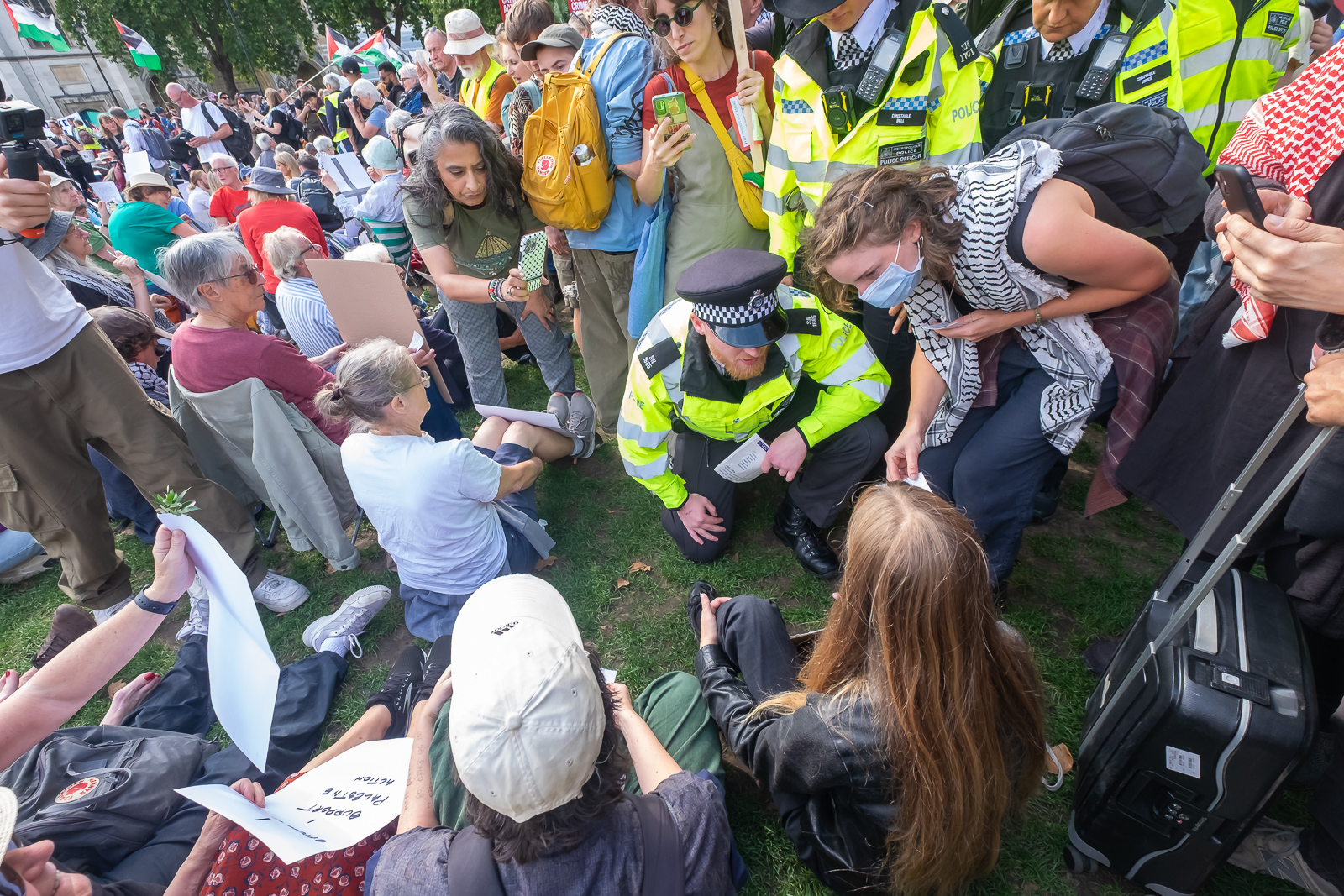Arrests outside Parliament risk centring liberal freedoms instead of Palestinian survival
~ Kell w Farshéa ~
Its 9pm, last Saturday (6 September). I’m standing on the pavement in the dark, watching the arrests. Police vans queue down the side of Parliament Square, engines idling. Police in high-vis jackets wade through the crowd of chanting singing people. Every five minutes cops emerge from the crowd carrying someone pron,e whilst another cop walks alongside telling them that they are being arrested under the Terrorism Act 2000.
A group of supporters chanting “we are the revolution” accompany a man walking to the police van. Others shout “shame, shame” or “are you proud of yourself”. On and on it goes. Yet how English and polite and obedient it is. People are quietly carried to the vans where they climb inside unaided. I see people chat to the police officers as if we are all on the same side—decency, civility, democratic values, common outrage. The hours pass, more people are driven off through the police road block to the police cells.
Its relentless.
Google tells me that in August 2025 there were only 900 cells available in UK men’s prisons. Yet almost 1,500 people have been charged for explicitly stating they support Palestine Action. Indeed the internet suggests many people charged will face a fine rather than imprisonment. The Prime Minister and his new Home Secretary look like paper tigers, not resolute law makers. 1,500 people showing they are not afraid of the consequences in breaking one of the more serious crimes on statute because the law is seen as morally bankrupt.

There is something powerful in this spectacle of defiance played out in front of parliament at night. And yet If passive resistance is so powerful, if the prison and police cells are in such short supply—why have the mass protests against genocide not brought 100,000 marchers to sit down in the streets of London? Indeed why was it only when UK citizen’s rights were threatened that people were prepared to be arrested en masse?
I am absolutely sure that members of Palestine Action still want the focus to be on Gaza, but it seems like white liberalism is now more focussed instead on the proscription itself. And beyond the sight of elderly pensioners bedecked in military medals being arrested—how effective is this protest at stopping the genocide and ending the occupation? How much has the proscription taken the focus off the millions being starved to death in Gaza?
Perhaps in the face of almost two years of mass demonstrations, emails and petitions it is understandable that people grasp for some kind of meaningful protest. Yet in an age when Parliament is uninterested in moral, genocidal, ecocidal or democratic principles, this may no longer be relevant. And yet, the questions must be asked. How can we more effectively resist the actual genocide? How can we avoid centring the debate over liberal democratic ideas and conditional freedoms, and instead re-centre it on the colonial capitalist murder of the people of Palestine?

Let us remember that Mr. Starmer is not sympathetic to principled ‘gesture’ arrests. He is on record saying XR actionists should get long sentences. Starmer endorses segregationist policies for trans people and leans into Farage and the EDL’s fascist language on immigration. He would leave every pensioner in London on bail and still not allow PA to return.
The mass arrests on Saturday were magnificent, cinematic even. But lets not pretend it’s not a sideshow distracting from the real issue—ending the genocide and fighting for a Free Palestine. Not one Palestinian child’s life will be saved by any of these arrests unless they refocus on the key issue: that while the government mouths platitudes about the man-made famine, it provides logistical support for drone attacks on children and targeted assassinations of journalists.
— “C’est magnifique, mais ce n’est pas la guerre” (French General Pierre Bosquet on the charge of the British Light Brigade at Balaclava, 25 October 1854)
Photos: Peter Marshall
